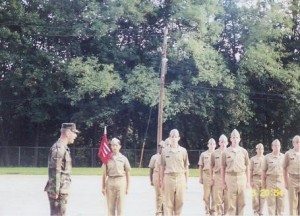The type of work that I’m good at leans towards internal support – I usually do research for our business development. It’s the stuff that fades to the background and gets lost among the crowd of client accounts we’re handling. It’s what tends to be ignored or forgotten, and is hardly ever recognized. Yet, it’s critical to any organization, as it is for ours, since we need to stay up-to-date with developments in the field and have articles to reference to create new programs. I’m used to being in the background unseen, like stage crew in their black outfits to blend in with the darkness. Unfortunately, when you aren’t seen, sometimes your effects are not felt or understood very well and this can create a sense of mystery about what work you do. If people don’t know what you’re working on, they’ll often draw the conclusion that you’re not really doing anything – after all, where are the results?

It can get pretty overwhelming. photo credit: awriterinthedesert.wordpress.com
Well, in the field of research, a lot of time is spent searching and filtering through information with little result to show. So though a lot of time and effort goes into producing just one little thing, all others see is that one thing you did produce. Nobody knows how many different ways you had to look and all the reading you scoured to get to the end result; after all, it’s only what you find that is relevant that matters. And to them, this looks like it could be easily accomplished, so your work tends to get discounted in the process. There’s a lot of room for misunderstandings and certainly a lot will occur. So, in an effort to curtail this, I’ve decided to take a more proactive approach. Whereas before I would just report that I’m doing research as I always do, with nothing exciting to update, now I’ve chosen to mention more specifically what I’m doing.
In a way, it’s just to save my own butt – after all, all the stuff we’re doing for clients gets recorded, but the internal stuff doesn’t. I don’t want people to look back and wonder what in the world was going on for business development efforts. I want them to see all the areas we were exploring and see the contributions that I made. This is something I’ve known intuitively for a long time. After I started here, I kept a running list of things that I had worked on so I could look back and appreciate what I’ve done and what I learned from that. This way I have solid proof and examples to use when I look back on my experience and I can at least vaguely measure how I grew professionally. For this line of work, you either need to stand up for yourself or just allow yourself to be used as a stepping stone for the other work. There won’t be anyone to look out for you and make sure that your efforts are recognized, save for the leader who notices and appreciates (like Starfish, who made a point to thank Skim and I for our work).

First chair recognizing the rest of the orchestra. photo credit: merinospace.com
I think it’s something important for any leader to look out for. When you don’t neglect those who often are, it means a lot to them. In any team, you will need people to be front runners and, in musical terms, first chair. However, it’s equally important that you have a strong “second fiddle” and entire orchestra to truly play wonderful music. Without those to harmonize, you’re left with a solo act that can have its own benefits, but will never compare to an entire symphony. Only by taking care of all your people can the engine of the business run smoothly. It’s a good lesson for my future intentions to start my own firm. The problem is, I’m going to need to be more of a first chair to be able to start a company. I could try to find a business partner to be my counterpart, but being second fiddle doesn’t mean I don’t want to be recognized. It just means that with my skills, I’m better at producing a different type of sound to complement that of first chair. I guess the question is: Do I have the willpower to take on both roles?
















